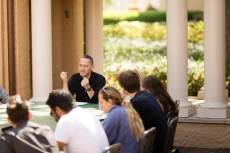Structured Support
With myriad resources and services, you’ll receive a strong foundation at Rollins on which to build your dreams.
April 11, 2024

The Princeton Review recently ranked Rollins in the nation’s top 25 schools for student support. The rankings, which are based on real student feedback, reflect our commitment to giving you the care and support you need to live your best life. At Rollins we focus on the whole student, offering a vast array of supportive programs and resources that target the many layers of your college education—from juggling academics to finding your fit on campus to maintaining your mental health. Explore a few of the many ways we have your back every step of the way.

Extra help is always available.
Need a little more guidance in a course or with a paper? You can get one-on-one help from content tutors in our STEM Hub and from writing consultants in the Tutoring & Writing Center, where you can talk through concepts and drafts and improve your comprehension and skills.

You’ll have the opportunity to get a head-start.
Rollins offers several pre-matriculation programs that prepare students to thrive academically and socially once classes begin. EMBARK, for example, supports underrepresented students as they acclimate to college life. “Through activities around identity and privilege, EMBARK helped shape my perspective,” says Carla Daza ’20, who uses EMBARK principles like empathy every day in her role as a data scientist at Target.

You’re never alone on your journey.
“The mentorship I’ve received at Rollins has played a pivotal role in my development,” says Elle Mannino ’25, a double major in philosophy and public policy and political economy. “These relationships have encouraged me to explore diverse perspectives and are fueling my aspiration to contribute meaningfully through a career in public policy.”

You’ll stay healthy and well.
Health and wellness are at the core of a Rollins education. The Rollins Wellness Center handles everything from routine exams to urgent care, and Rollins dining is consistently rated among the best in the country. It’s also easy to grab a stress-relieving workout on America’s most beautiful campus—from yoga on Mills Lawn to paddleboarding on Lake Virginia.

Our faculty are invested in you.
From convocation through commencement, you have a dedicated faculty advisor—starting with your first-year Rollins College Conference (RCC) professor and then in your major—who will help you channel your passions and forge your path.

We’ll help you plan for the future.
The dedicated staff in our Center for Career & Life Planning will help prepare you to pursue your purpose by connecting your major to your career goals, identifying your unique skills, building your network, and sourcing internship and employment opportunities both on campus and beyond.

Finding your fit is easy.
Join one of our 100-plus student-led organizations or start your own. Make a difference by serving our community. Take part in campus-wide traditions like LipSync and Fox Day. We have entire offices dedicated to things like campus involvement, inclusion and belonging, and community engagement, so you’ll feel at home from day one.

You’ll have access to 24/7 mental health support.
Sometimes we need someone to talk to about things big and small. That’s normal and we’re here to help—whether it’s through ongoing support like individual or group therapy or our Rollins Mental Health Helpline, which is available around the clock.

Rollins is more affordable than you might think.
We have $89 million in combined federal, state, and institutional assistance available each year to Rollins students, and our Office of Financial Aid is here to help you tap into it.

You’ll always have access to the essentials.
For those facing financial challenges, our Student Support Foundation maintains a food pantry, which has been recently expanded to other perishable and nonperishable food, hygiene products, school essentials, and a career closet of professional attire for interviews. Grants are also available for educational, personal, and professional development.
- Categories:
- Mentorship |
- Financial Aid |
- Student Organization |
- Embark

See for Yourself
Get a feel for Rollins’ unique brand of engaged learning and personalized attention through one of our virtual or in-person visit experiences.
Take a Closer LookRecent Stories
February 27, 2026
Black History Month Celebrates 100 Years
Dean of Religious and Spiritual Life at Rollins College, Harold “Dorrell” Briscoe, discussed the 100-year anniversary of Black History Month, why it started, who started it, and why it’s important today on Central Florida Public Media’s ENGAGE (28:57)
February 26, 2026
Communication Professor Breaks Down Social Media Algorithms
Rachel Winter, a lecturer in communication and director of the Strategic Communication Master’s Program at Rollins College, provided expertise on social media algorithms to FOX 35.
February 25, 2026
Rodelo ’27 Selected for National LEAD 250 Democracy Fellowship
Stephanie Rodelo ’27 has been chosen for the Leadership, Engagement & Action for Democracy (LEAD) 250 Fellowship, a new civic fellowship program.
